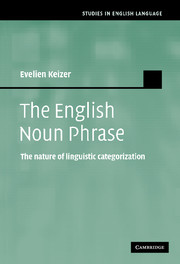Book contents
- Frontmatter
- Contents
- Acknowledgements
- 1 Introduction
- PART I The structural approach: possibilities and limitations
- PART II The cognitive-pragmatic approach: some applications
- 9 The flexibility of language
- 10 Complements and modifiers
- 11 Discontinuous NPs
- 12 Possessive constructions: the author's opinion versus the opinion of the author
- 13 Conclusions
- Bibliography
- Author index
- Subject index
13 - Conclusions
Published online by Cambridge University Press: 25 January 2010
- Frontmatter
- Contents
- Acknowledgements
- 1 Introduction
- PART I The structural approach: possibilities and limitations
- PART II The cognitive-pragmatic approach: some applications
- 9 The flexibility of language
- 10 Complements and modifiers
- 11 Discontinuous NPs
- 12 Possessive constructions: the author's opinion versus the opinion of the author
- 13 Conclusions
- Bibliography
- Author index
- Subject index
Summary
The aim of this study has been twofold. First, detailed analyses have been offered of the syntactic, semantic, pragmatic and cognitive aspects of a considerable number of (bi)nominal constructions in an attempt to add to our general understanding of the form and function of the English noun phrase. Secondly, questions have been raised concerning the nature of linguistic classification and the advantages and disadvantages of formal representations. Although both issues have been addressed throughout the book, it will be clear that part I has been primarily concerned with the first aim, while part II has dealt more specifically with the second issue.
The close examination of the various binominal constructions in part I is intended to offer a more unified and consistent treatment of headedness in these constructions than provided in existing accounts, bringing together various other important aspects of the noun phrase, such as referentiality and predication, definiteness, determination and quantification, and the information status of the two nominal elements. At the same time, however, it has been shown that the classifications and representations offered have their limitations, and that even careful consideration of the syntactic, semantic and pragmatic properties of genuine examples in their original discourse context cannot capture the full complexity and flexibility of language use.
One of the reasons for this failure, it has been argued, is that linguistic expressions as well as linguistic categories exhibit prototype effects, and that the classifications proposed and the various categories distinguished should not be seen as discrete and invariable, but as graded and flexible.
- Type
- Chapter
- Information
- The English Noun PhraseThe Nature of Linguistic Categorization, pp. 355 - 356Publisher: Cambridge University PressPrint publication year: 2007



